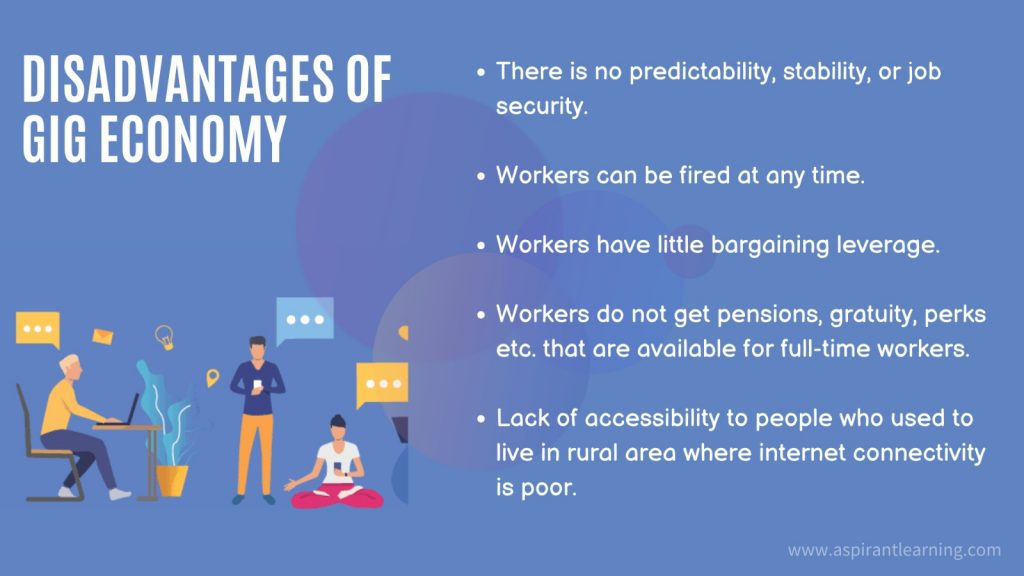News Highlight
Code on Social Security, 2020 envisages benefits for gig and platform workers.
Key Takeaway
- Maintaining excellent industrial relations has been delegated to the Central Industrial Relations Machinery (CIRM).
- In addition, workers’ interests in establishments under Central Government supervision are protected.
- The respective State Governments have control over concerns concerning delivery employees.
- For the first time, the definitions of “gig worker” and “platform worker” are included in the Code on Social Security, 2020.
Gig and Platform Workers
- Gig Workers
- Gig workers work hourly or part-time in jobs ranging from catering to software development.
- They have an unusual work arrangement with their employers and a unique employer-employee relationship.
- The task is usually temporary and must be completed within a certain time.
- The Code on Social Security, 2020 [Section 2(35)] defines a gig worker as a person.
- They perform labour or participate in a work arrangement and earn money from such activities outside of traditional employer-employee relationships.’
- Gig workers include freelancers, contingent employees, and independent contractors.
- A part-time professor can also be considered a gig worker.
- Platform Workers
- A platform worker works for a company offering online services to individuals or businesses.
- Platform workers include Ola or Uber drivers, Swiggy or Zomato delivery agents, etc.
- A platform worker is defined as “a person engaged in or undertaking platform work” by the Social Security Code.
- Platform work is defined in Section 2(55) of the Code as a type of employment in which organisations or individuals use an online platform.
- It is to access other organisations or individuals in exchange for payment to solve specific problems or provide specific services.
- This work also falls outside of the typical employee-employer relationship.
Gig & Platform Work
- Pros
- It provides workers freedom by allowing them to work for many businesses simultaneously and, in certain situations, set their salary.
- It allows professionals to put their skills to the test in an area of interest to them.
- For example, independent writers can try a part-time job before committing to it full-time.
- This type of labour also allows for the employment of remote people.
- Cons
- Such workers are typically denied advantages that companies provide to regular employees, such as health insurance and paid leave.
- Such work generallyIssues faced by the Platforms Workers suffers from variable remuneration and a lack of job stability.
- While it is true that gig and platform workers have greater employment freedom.
- They are still bound by control mechanisms wired by the platforms’ algorithms.
- This impacts work hours, cost, and so forth.
- Furthermore, access to vehicular assets is required for entry into on-demand platform work such as ride-sharing and food delivery.
- It is insufficient for the average Indian worker.
- Such workers rely on intense financing plans to enter the platform economy.
- Platform aggregator corporations frequently enable them.
Issues Faced by the Platforms Workers
- Classification as Employees
- One platform workers’ biggest challenge is that they are frequently classed as independent contractors rather than employees.
- As a result, they are ineligible for minimum wage, overtime pay, and workers’ compensation benefits.
- Low Wages
- Many platform workers in India are paid very little, frequently less than the minimum wage.
- This is partly due to platform companies competing on pricing and a vast pool of people ready to accept low-paying jobs.
- Long Working Hours
- Platform employees must frequently work long hours to sustain themselves and their families.
- This can result in exhaustion and burnout.
- Lack of Social Protection
- Platform workers cannot access social security benefits like pensions or insurance.
- This puts them in danger of an accident or illness.
- Discrimination
- Some platform firms have been accused of discriminating against specific worker groups, such as women or workers from lower castes.
- Dalit gig workers endure prejudice regarding limited employment opportunities, low earnings, and social marginalisation.
- After learning about the faith of Muslim delivery drivers, some clients may refuse to use their services or cancel their purchases.

Way Forward
- The most critical lesson from China is the surge of public opinion, which has resulted in government regulation and changes in corporate policies.
- Customers in the United States have been urged to remove the Instacart app as a sign of solidarity until requests for better working conditions are realised.
- Indians should learn more about how platforms work by approaching delivery personnel and inquiring about their working conditions and the difficulties they experience.
- We will then be aware of the cost that a person, who appears just as a small bike on our apps, pays for our convenience.
Pic Courtesy: Gigonomy
Content Source: PIB



